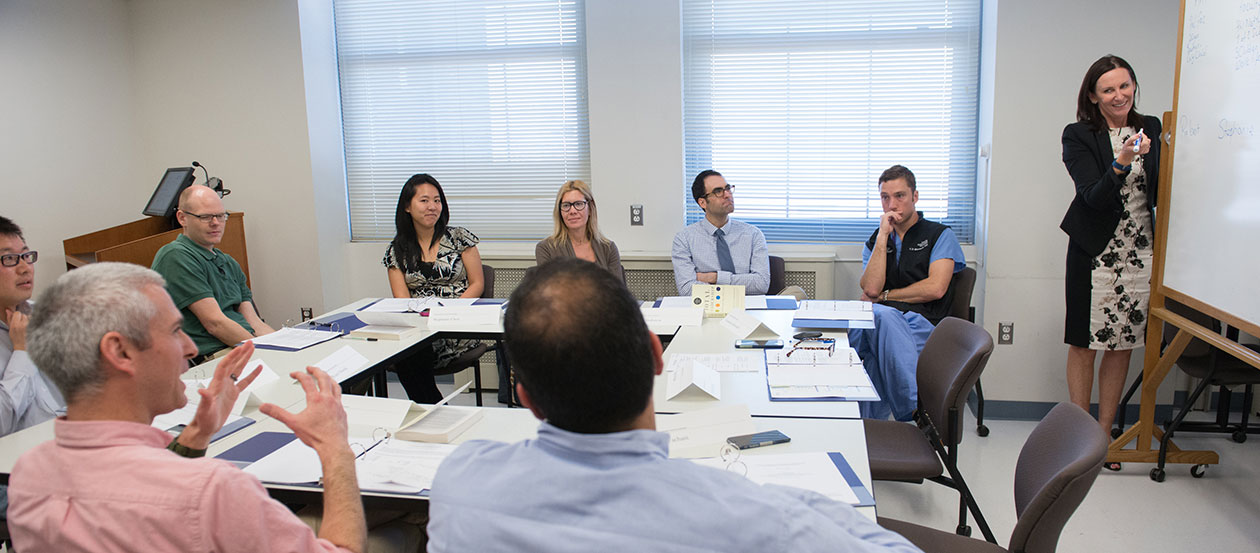Research Mentor Training at ITMAT Education
The next training dates for 2024 will be available soon!

What is mentoring today? Today’s definition of mentoring extends far beyond the traditional role of academic supervisor. Presenting a wide spectrum of ever-changing expectations and responsibilities, it has come to define a dynamic and collaborative learning relationship of which—if carried out effectively—both mentor and mentee can personally and professionally prosper. But what does it require to be an effective mentor?
The Research Mentor Training program at ITMAT Education teaches mentors the key determinants for creating a culture of strong mentorship, using case scenarios to enhance mentee self-efficacy, work-life integration, and overall career satisfaction to ensure successful scholar outcomes from all individuals pursuing research.
We speak to all levels of mentoring. Are you a senior-level faculty member looking for a refresher course, or a junior faculty member in the midst of building your lab? Our training modules are available for research mentors of undergraduate and graduate students, clinical fellows, postdoctoral researchers, or junior faculty working with trainees across the medical and health sciences. Our programs recognize diversity among mentors at all career stages and address individual needs in the format of an annually scheduled cohort training or as requested custom training modules.
Our program is evidence-based. The Research Mentor Training program at ITMAT Education is based on a nationally recognized model and proven-effective curriculum developed at the Center for the Improvement of Mentored Experiences in Research (CIMER) at the University of Wisconsin-Madison. CIMER is home to the Coordination Center of the National Research Mentoring Network (NRMN), which is part of a broader NIH consortium dedicated to enhancing diversity in the biomedical research workforce through strong mentoring and other initiatives.
The benefits are clear. Learn how to establish a mentoring identity, become a more intentional mentor, and master programmatic elements of effective mentoring practices so that you and your mentees both benefit from the relationship and find personal satisfaction as well as academic success.
Contact us to learn more about our Research Mentor Training programs.
Mentoring Resources
Facilitators & Advocates of Mentor Training within PSOM
Elizabeth Olson Hexner, MD, MSTR. Associate Professor of Medicine, Division of Hematology Oncology.
As an Associate Director of the Masters in Translational Research program, and course director for Cell and Gene Therapy, I have a particular interest in facilitating trainees and junior faculty to become clinical and translational scientists. An essential piece of career development is a healthy mentoring relationship; this can be developed and fostered with purposeful mentee and mentor training.
Jennifer M. Kalish, MD, PhD, MSTR. Assistant Professor of Pediatrics, Division of Human Genetics.
Participation in Research Mentor Training has helped me reflect on my mentorship style and develop new approaches to the mentor-trainee relationship. I recommend this program because it helps mentors develop a framework for mentorship.
Despina Kontos, PhD. Associate Professor of Radiology.
As junior faculty at the time, the research mentor training helped me reflect upon the kind of mentor I wanted to become so that I could motivate and guide my own mentees in an inspirational way. It also helped me develop the skills needed to achieve this goal by connecting me with a diverse group of senior mentors and other mentees in the early stages of my career. It was a superb experience altogether, and I highly recommend the program to all levels of faculty—from junior to senior—as being a good mentor is a process that continuously evolves!
Pamela Weiss, MD, MSCE. Associate Professor of Pediatrics and Epidemiology.
Successful mentorship requires both an effective mentee and a skilled mentor; when this relationship is primed and fine-tuned, it can be one of the most rewarding aspects of participating in patient-oriented research. Formal mentor training will take your skillset to the next level, improve your communication skills, and help you maximize both your own and your mentees’ potential and ultimate success.

